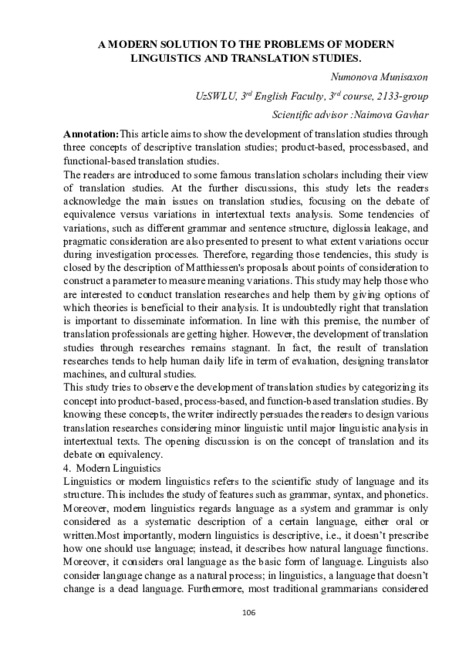
106
A MODERN SOLUTION TO THE PROBLEMS OF MODERN
LINGUISTICS AND TRANSLATION STUDIES.
Numonova Munisaxon
UzSWLU, 3
rd
English Faculty, 3
rd
course, 2133-group
Scientific advisor :Naimova Gavhar
Annotation:
This article aims to show the development of translation studies through
three concepts of descriptive translation studies; product-based, processbased, and
functional-based translation studies.
The readers are introduced to some famous translation scholars including their view
of translation studies. At the further discussions, this study lets the readers
acknowledge the main issues on translation studies, focusing on the debate of
equivalence versus variations in intertextual texts analysis. Some tendencies of
variations, such as different grammar and sentence structure, diglossia leakage, and
pragmatic consideration are also presented to present to what extent variations occur
during investigation processes. Therefore, regarding those tendencies, this study is
closed by the description of Matthiessen's proposals about points of consideration to
construct a parameter to measure meaning variations. This study may help those who
are interested to conduct translation researches and help them by giving options of
which theories is beneficial to their analysis. It is undoubtedly right that translation
is important to disseminate information. In line with this premise, the number of
translation professionals are getting higher. However, the development of translation
studies through researches remains stagnant. In fact, the result of translation
researches tends to help human daily life in term of evaluation, designing translator
machines, and cultural studies.
This study tries to observe the development of translation studies by categorizing its
concept into product-based, process-based, and function-based translation studies. By
knowing these concepts, the writer indirectly persuades the readers to design various
translation researches considering minor linguistic until major linguistic analysis in
intertextual texts. The opening discussion is on the concept of translation and its
debate on equivalency.
4.
Modern Linguistics
Linguistics or modern linguistics refers to the scientific study of language and its
structure. This includes the study of features such as grammar, syntax, and phonetics.
Moreover, modern linguistics regards language as a system and grammar is only
considered as a systematic description of a certain language, either oral or
written.Most importantly, modern linguistics is descriptive, i.e., it doesn’t prescribe
how one should use language; instead, it describes how natural language functions.
Moreover, it considers oral language as the basic form of language. Linguists also
consider language change as a natural process; in linguistics, a language that doesn’t
change is a dead language. Furthermore, most traditional grammarians considered

107
written form as the most important aspect of language; however, modern linguists
consider speech as the most important aspect of language. Moreover, traditional
grammar attempted to force language into a Latin-based framework, but modern
linguists do not judge one language by the standards of another
.Linguistics is the scientific study of human language.[1][2] It entails a
comprehensive, systematic, objective, and precise analysis of all aspects of
language,[3] particularly its nature and structure.[4] As linguistics is concerned with
both the cognitive and social aspects of language, it is considered a scientific field as
well as an academic discipline;[5] it has been classified as a social science,[6] natural
science,[7] cognitive science,[8] or part of the humanities. Traditional areas of
linguistic analysis correspond to phenomena found in human linguistic systems, such
as syntax (rules governing the structure of sentences); semantics (meaning);
morphology (structure of words); phonetics (speech sounds and equivalent gestures
in sign languages); phonology (the abstract sound system of a particular language);
and pragmatics (how social context contributes to meaning).
3
Subdisciplines such as
evolutionary linguistics (the study of the origins and evolution of language) and
psycholinguistics (the study of psychological factors in human language) bridge
many of these divisions.Linguistics encompasses many branches and subfields that
span both theoretical and practical applications.
4
Theoretical linguistics (including
traditional descriptive linguistics) is concerned with understanding the fundamental
nature of language and developing a general theoretical framework for describing it.
Applied linguistics seeks to utilise the scientific findings of the study of language for
practical purposes, such as developing methods of improving language education and
literacy.
Linguistic phenomena may be studied through a variety of perspectives:
synchronically (describing a language at a specific point of time) or diachronically
(through historical development); in monolinguals or multilinguals; children or
adults; as they are learned or already acquired; as abstract objects or cognitive
structures; through texts or oral elicitation; and through mechanical data collection
versus fieldwork.
REFERENCES
1)
Journal of English and Education, Vol. 6 No.2 - December 2012
2)
https://www.linguisticsociety.org/resource/history-modern-linguistics
3)
The History of Modern Linguistics by Frederick J. Newmeyer
4)
Мусурманова, О., et al. "Педагогик атамалар луғати: ўзбек, рус, инглиз
тилларида." Т.:“TURON_IQBOL (2019).
5)
Палуанова, Х. Д. "Экологик терминларнинг деривацион хусусиятлари." Т.:
Фан ва технология 152 (2016).
3
)
https ://www. linguisticsociety. org/resource/historv-modern-linguistics
4
Journal of English and Education, Vol. 6 No.2 - December 2012






